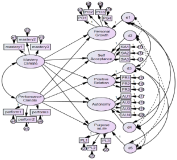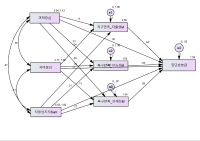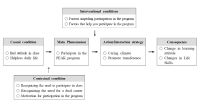
Purpose This study identified the influence of perceived motivational climate on psychological well-being in ballet majors. Methods Participants were 211(male=25, female=186) collegiate students enrolled in ballet department. Measures were The Perceived Motivational Climate in Sport Questionnaire(PMCSQ) and Psychological Well-being Questionnaire. Data were analyzed by using descriptive statistics, reliability test, correlation, and structural equation modeling. Results Results were as follows. First, mastery climate who ballet majors perceive significantly influenced on the five subscales of their psychological well-being: Mastery climate was positively related to personal growth, self-acceptance, positive relation with others, autonomy, and purpose in life. Second, performance climate who ballet majors perceive significantly influenced on the five subscales of their psychological well-being: Performance climate was negatively related to personal growth, self-acceptance, positive relation with others, autonomy, and purpose in life. Model fit indices were acceptable(RMSEA=.070). Conclusion In conclusion, this study indicated that motivational climate who ballet majors perceive was a important situational factor on their psychological well-being.

PURPOSE This study analyzed the relationship among coaching behaviors, motivational climate, sports competence, effort, and failure tolerance as perceived by high school athletes. Additionally, it examined whether motivational climate, competence, and effort mediate the relationship between coaching behaviors and failure tolerance. METHODS Using questionnaires measuring autonomy-supportive coaching behavior, controlling coaching behavior, motivational climate, sports competence, effort, and failure tolerance, 365 high school athletes were surveyed. Using SPSS 28.0 and Amos 28.0 software, descriptive statistics and structural equation modeling were conducted along with the following types of analyses: reliability, correlation, confirmatory factor, convergent validity, and discriminant. Additionally, the bootstrap method was used to verify serial multiple mediating effects. RESULTS Autonomy-supportive behavior had a significant positive effect 1) on motivational climate, sports competence, and effort and 2) on failure tolerance. 3) Controlling coaching behavior had a significant negative effect on motivational climate and sports competence. 4) Motivational climate and 5) sports competence both had a significant positive effect on effort. 6) Effort had a significant positive effect on failure tolerance. Last, in the relationship between autonomy-supportive behavior and failure tolerance, motivational climate, sports competence, and effort showed partial mediating effects. CONCLUSIONS This study confirms the importance of coaches’ autonomy-supportive behavior in determining failure tolerance among adolescent athletes. Based on this information, counseling (educational) programs aimed at enhancing performance can be developed and provided in sports settings, thus fostering success among athletes.

In sport context, the motivational climate created by significant others (e.g., coachs and peers) has been influences on the athletic-student's motivation, engagement, performance, and skill development. Collective efficacy is important for team performance because it influences a group's task choice, effort expenditure, persistence in the face of failure, and resistance to discouragement. This study was to examine the influence of peer motivational climate (i.e., task-involving and ego-involving motivational climate) and coach autonomous support for basic psychological need satisfaction and collective efficacy. In the study, participants were 289 athletic-students' of team sports. In the study then, questionnaire was assessed using by the correlation and path analysis. The results showed that task-involving motivational climate significantly predicted of collective efficacy, while ego-involving motivational climate were negatively predict to the collective efficacy. The results suggest the importance of considering peer influence in addition to coach influence when examining motivational climate in team sport.

PURPOSE For student-athletes to be able to successfully dedicate themselves to training and competition, the following key factors play an important role: The coach, team climate, and individual motivational characteristics. To test this hypothesis, the structural relationships between having a perceived autonomy support, a caring climate, basic psychological needs, and sport commitment were analyzed. METHODS Participants were 297 high school athletes registered with the Korea Olympic Committee (203 males, 94 females, Mage=17.88 years). Data were collected using sports climate questionnaires for autonomy support, caring climate scale, basic psychological needs scale, and sport commitment measurement. The collected data were analyzed using descriptive statistics, correlation analysis, and structural equation modeling. RESULTS The model’s fitness was indicated by x2/df=2.797 (x2=106.288, df=38), CFI=.977, TLI=.967, RMSEA=.078 (90% CI=.061, .096). Examining the various path coefficients revealed that coach autonomy support had a positive effect on the athlete’s caring climate, basic psychological needs, and sport commitment. The caring climate had a significant effect on basic psychological needs, but did not have a statistically significant effect on sport commitment. Finally, basic psychological needs had a positive effect on sport commitment. CONCLUSIONS Coach autonomy support fosters a caring climate, and athletes who are able to perceive this are able to dedicate themselves to their sport since their basic physiological needs are met. Therefore, coaches should use appropriate coaching strategies to enhance athletes' autonomy and foster a caring climate, as both are essential factors for meeting athletes' psychological needs and promoting sport commitment.

Purpose The purpose of this study was to explore the process of participation in the PEAK program of collegiate athletes based on grounded theory. Methods In-depth interviews were conducted with 12 athletes from Y University who were registered in Korea Taekwondo Association. The collected data were analyzed by using the open coding, axis coding, and selective coding of the grounded theory, completed the paradigm model among the extracted concepts, and extracted the core categories through the story outline. Results As the result of data analysis, 'participating in the PEAK program' was found as the central phenomenon, and the causal situation was 'bad attitude in class' and 'helpless daily life'. The contextual conditions were 'recognition of the need for class participation and dual career' and 'motivation to participate in the program', and the intervening conditions were 'factors that hinder participation in the program' and 'factors that help program participation'. The action/interaction strategies were ‘caring climate’ and ‘promoting transfer’, and depending on the consequence, ‘learning attitude change’ and ‘life skill change’ appeared. Conclusion Participants improved their learning attitude through the PEAK program and confirmed the possibility of life skills transfer. It is hoped that this study can lead to implementation of various studies and discussions about life skills and transfer.
